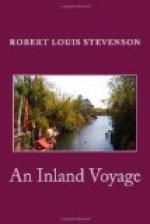They began to ask about our voyage. You should have seen how they sympathised. They seemed half ready to give up their barge and follow us. But these canaletti are only gypsies semi-domesticated. The semi-domestication came out in rather a pretty form. Suddenly Madam’s brow darkened. ‘Cependant,’ she began, and then stopped; and then began again by asking me if I were single?
‘Yes,’ said I.
‘And your friend who went by just now?’
He also was unmarried.
O then—all was well. She could not have wives left alone at home; but since there were no wives in the question, we were doing the best we could.
‘To see about one in the world,’ said the husband, ’il n’y a que ca—there is nothing else worth while. A man, look you, who sticks in his own village like a bear,’ he went on, ’—very well, he sees nothing. And then death is the end of all. And he has seen nothing.’
Madame reminded her husband of an Englishman who had come up this canal in a steamer.
‘Perhaps Mr. Moens in the Ytene,’ I suggested.
‘That’s it,’ assented the husband. ’He had his wife and family with him, and servants. He came ashore at all the locks and asked the name of the villages, whether from boatmen or lock-keepers; and then he wrote, wrote them down. Oh, he wrote enormously! I suppose it was a wager.’
A wager was a common enough explanation for our own exploits, but it seemed an original reason for taking notes.
THE OISE IN FLOOD
Before nine next morning the two canoes were installed on a light country cart at Etreux: and we were soon following them along the side of a pleasant valley full of hop-gardens and poplars. Agreeable villages lay here and there on the slope of the hill; notably, Tupigny, with the hop-poles hanging their garlands in the very street, and the houses clustered with grapes. There was a faint enthusiasm on our passage; weavers put their heads to the windows; children cried out in ecstasy at sight of the two ’boaties’—barguettes: and bloused pedestrians, who were acquainted with our charioteer, jested with him on the nature of his freight.
We had a shower or two, but light and flying. The air was clean and sweet among all these green fields and green things growing. There was not a touch of autumn in the weather. And when, at Vadencourt, we launched from a little lawn opposite a mill, the sun broke forth and set all the leaves shining in the valley of the Oise.
The river was swollen with the long rains. From Vadencourt all the way to Origny, it ran with ever-quickening speed, taking fresh heart at each mile, and racing as though it already smelt the sea. The water was yellow and turbulent, swung with an angry eddy among half-submerged willows, and made an angry clatter along stony shores. The course kept turning and turning in a narrow and well-timbered valley.




